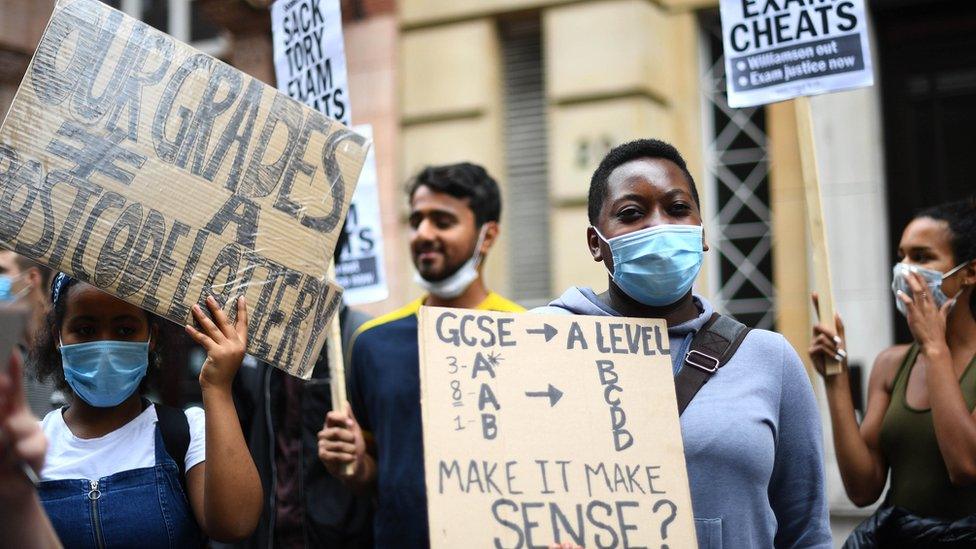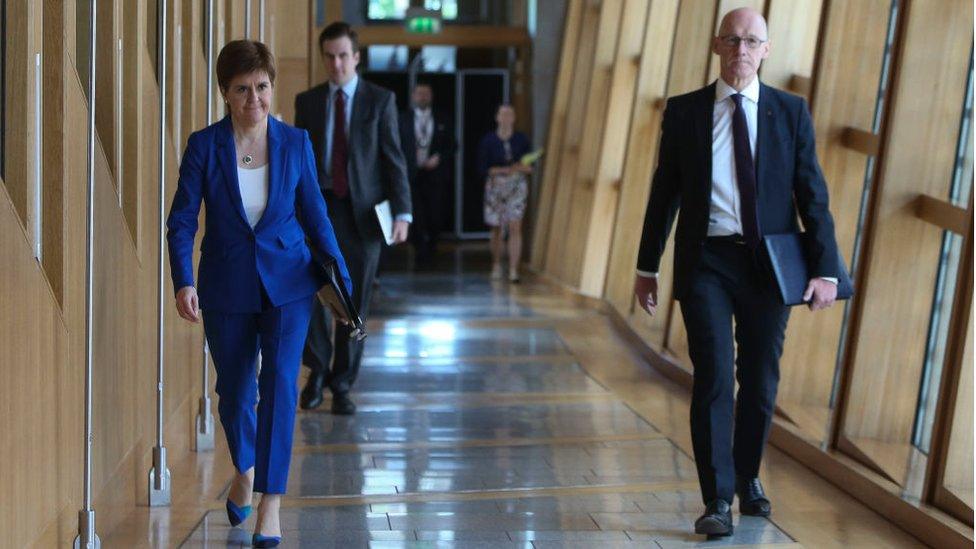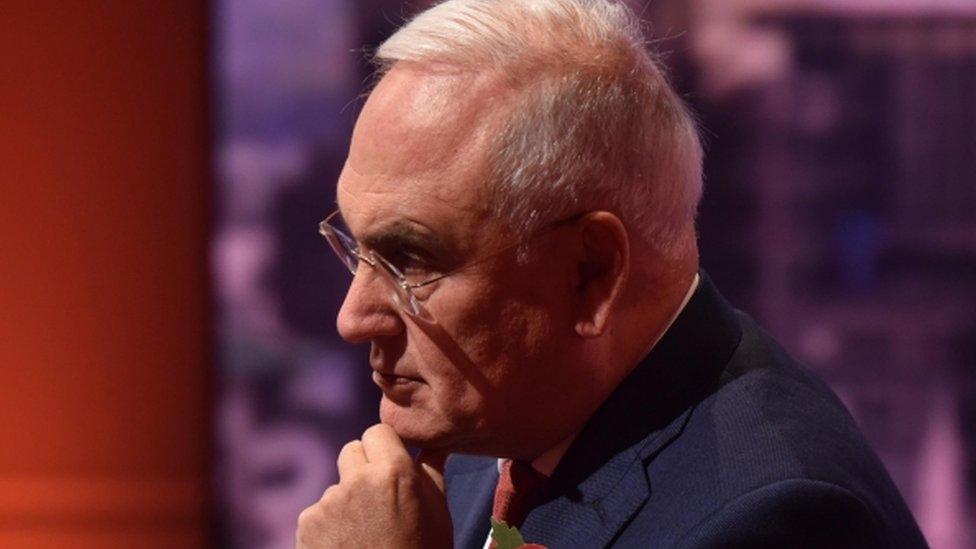Scotland makes first move in reducing exams. Who is next?
- Published
- comments

Exams are planned for next summer - not least to avoid a repeat of the protests over replacement grades
Exams are still going ahead next year across the UK - but not all of them and not necessarily in the way we might have known them, with trimmed-down content and later start dates.
After this summer's doomed attempts at producing replacement grades, an exam balancing act is emerging - with a desire to hold exams, but also recognising they will have to be cut back after so much lost time.
Scotland has been the first to announce how this will work - cutting the volume in half by switching National 5 qualifications to assessed grades rather than exams.

Nicola Sturgeon and John Swinney in Scotland have made the first move - switching half the exams to teacher assessment
This would allow Highers to go ahead as written exams, with a two-week delay - which in the context of England, Wales and Northern Ireland, would be like using coursework and tests for GCSEs while carrying on with slightly later exams for A-levels.
And if Highers cannot be taken, there would be a contingency plan to use grades "based on teacher judgement".
Scotland's Education Secretary John Swinney said it couldn't be "business as usual" for exams but also "there will be no algorithm".
So schools will be carrying out assessments and gathering evidence - two to four pieces of work per subject - which will be used, along with a process of moderation, to decide National 5 grades.
It's a big step - but Mr Swinney said with so much uncertainty about the next stages of the pandemic it was "too big a risk" to plan a full set of exams.
Lost time
All the exam plans across the UK are going to be different - but they all face the same two big problems.

Sir Michael Wilshaw is back teaching to help with Covid-related staff shortages
How can exams be run fairly when so much teaching time has been lost because of the pandemic?
And how do you make a definite plan for such an indefinite situation - where it's impossible to know how much more disruption might lie ahead?
In England, arguments over exams have become intertwined with wider Covid-19 decisions about regional lockdowns, "circuit breaker" shut downs and ideas such as extending half-term breaks.
The former Ofsted chief, Sir Michael Wilshaw, sums up the problem - not least in that he himself is now back teaching in the classroom, helping schools which are struggling with staff absences.

University terms could be put back if school exams are delayed, say ministers
"Given the fiasco of the summer, the government is probably right to go for end-of-year examinations," he says.
But Sir Michael says significant numbers of pupils and teachers are already out of school - and if that situation deteriorates in the winter, and exams are no longer viable, there has to be a very clear back-up plan.
"If there's too much disruption, the Department for Education and Ofqual have to make it absolutely clear to schools what forms of assessment will be used - which pieces of work, which mock exams and how they will be moderated," says Sir Michael.
Planning for no exams
This preparation for a Plan B already appears to be in process in Northern Ireland, as well as their existing proposals to slim down exam content.

There have been calls for a back-up plan in case exams cannot go ahead to avoid another summer of confusion
Education Minister Peter Weir said in a letter this week that the aim was for exams to go ahead, but: "We are also developing a plan for contingency should the situation change because of increased spread of Covid-19."
In England, a delay to the exam season of a few weeks has been proposed by the government since early summer - and yesterday the universities minister said university terms could start later to accommodate any changes.
But there is a clear commitment to going ahead with written exams as being the fairest option.

Decisions about schools are wrapped up in wider debates about local coronavirus lockdowns
The idea of a contingency plan in case exams do not go ahead might be politically difficult, when there is a desire to push the buttons for a return to normal life, but it's becoming increasingly hard to see how such back-up plans can be avoided.
In Wales, the current plan is also to go ahead with exams - again most likely with a delay and with reductions in the course content.
Fitting exams in the time left
The much thornier questions are around how exams will work when so much time has been lost - and when more time is still ticking away. This is going to mean chopping back and reducing subjects so they can be taught and examined in the shrinking time available.
With much of this term already disappearing, it could mean not so much an oven-ready plan for exams, but boil-in-the-bag.
There are now less than 130 teaching days before the usual mid-May start of exams - and with almost one in five secondary schools sending home pupils because of Covid outbreaks, even more days are under threat.
Head teachers' leader Geoff Barton said shifting the exam timetable back a few weeks would only mean a "marginal benefit" compared with the disruption that students have faced.

Almost one in five secondary schools are sending home pupils because of Covid-19 cases
There has to be a very significant reduction in the content of exams, says the leader of ASCL union - and a different approach to how questions are set.
This could mean having exam papers with many more options, so that students will have a topic they can answer no matter how much or how little of the course they have been able to cover.
This proposal has been included in a joint plan of action, put out this week by teachers and head teachers' unions, which calls for exams to be slimmed down, more flexibility over timing and standardised internal tests under exam conditions that could be used as evidence for grading if exams become no longer possible.
But as with anything exam-related, there is a pressure on time, and Mr Barton says there is great frustration among school leaders about the lack of clarity on what they should be preparing.
"The government really does need to get its skates on," he said.
